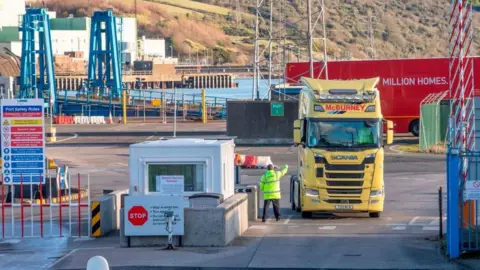NI Protocol: Latest bid to change legislation at Westminster fails
 BBC
BBCThe SDLP and Alliance have failed in their latest bid to change Northern Ireland Protocol legislation at Westminster.
The parties tabled a number of amendments to the bill but they were comfortably defeated by the government with the support of the DUP.
A third reading of the bill will be held on Wednesday.
The legislation would give ministers the power to scrap parts of the post-Brexit deal between the UK and the EU.
The protocol is part of the 2019 Brexit deal and keeps Northern Ireland in the EU's single market for goods, preventing a hard border with the Republic of Ireland.
But it means checks on some items which come into Northern Ireland from other parts of the UK, creating a trade border in the Irish Sea.
Unionist parties in Northern Ireland are all opposed to the protocol, and insist the legislation is necessary to protect NI's place in the UK.
During the debate, Cabinet Office minister Michael Ellis said "no business will be worse off as a result of UK action".
He added: "Whilst the Northern Ireland Protocol was agreed as we know with the best of intentions, it is causing real problems for people and businesses in Northern Ireland."
However, Alliance MP Stephen Farry said the bill would bring "major consequences" and "create chaos in many sectors of the Northern Ireland economy", while shadow Northern Ireland Secretary Peter Kyle said it would create "huge uncertainty".

What is in the Northern Ireland Protocol bill?
The UK government published plans for the bill earlier this month. At the centre of the proposal is the concept of green lanes and red lanes for trade.
This would mean:
- Goods coming from Great Britain into Northern Ireland and which are staying would use the green lane. This means there would be no checks and paperwork would be minimal
- GB goods moving through NI into Ireland or the wider European Union would use the red lane and continue to be checked at NI ports
London also wants any trade disputes resolved by "independent arbitration" and not by the European Court of Justice, and for Northern Ireland to benefit from the same tax breaks as elsewhere in the UK.


